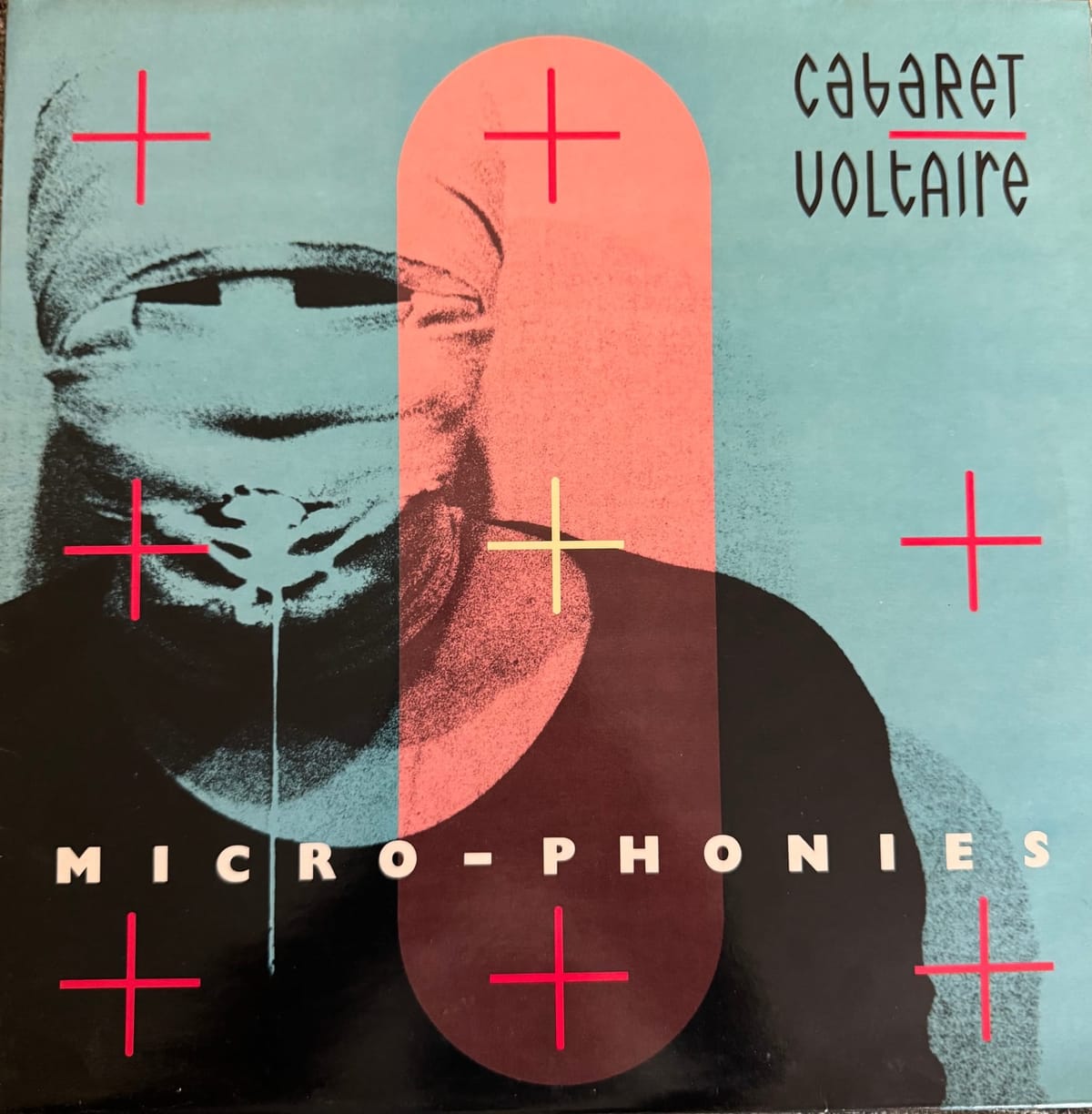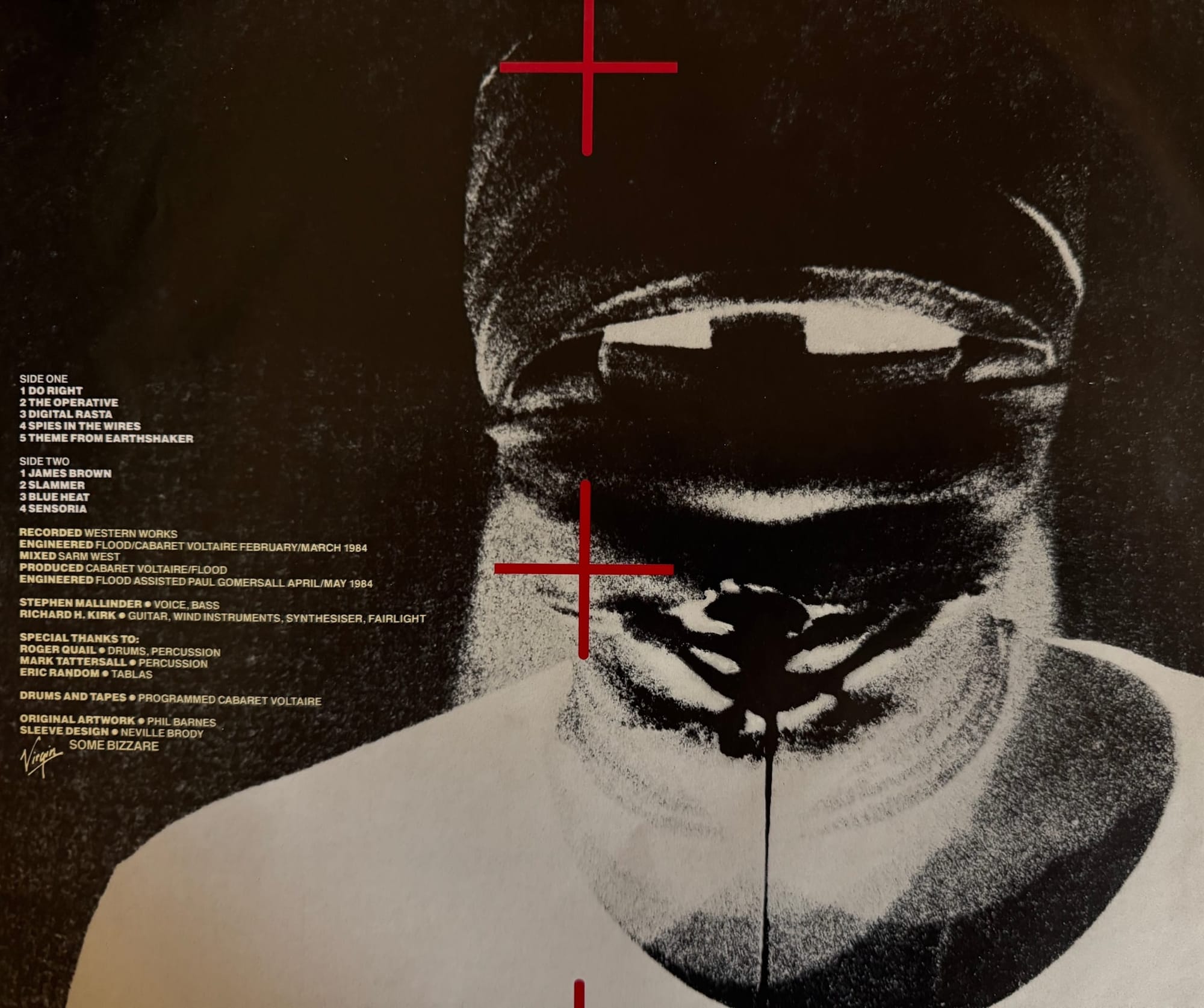Cabaret Voltaire - Micro-Phonies

Picking up the sleeve for Cabaret Voltaire’s “Micro-Phonies”, I can’t help but feel like the color scheme is that of a confused gender reveal for a baby. Is it a boy? Is it a girl? Is it a bandaged mummy-like figure with an unidentified liquid drooling from its mouth? Oh good, honey, exactly what I had hoped for! Let’s name it Voltaire! Incidentally, this record was born into the world about 3 weeks after I was in late October 1984. Where I have developed aches, pains, and my first grey hairs, the metal, plastic, gears, hammers, and circuit boards that make up this record have not aged a day. It probably still gets carded going to theaters or buying cigarettes.
Lest I sound negative, let me get a couple of things straight. The intersection of early industrial music, cold war paranoia, and 80’s tech sensibility is exactly the kind of space I love to inhabit. If I call this album cold, calculating, paranoid, repetitive, or anything else, these are compliments given the world that it inhabits.
I have seen reviews suggesting this album is Cabaret Voltaire’s first danceable album. I do not believe it is meant to be danced to. I see this album as the soundtrack to an 80’s spy thriller that never was, animated like TRON, but soundtracked like a numbers station sending coded messages to sleeper agents that have yet to awaken. A 42 minute movie about cryptologists, hackers, nuclear secrets, and all of the other Cold War accoutrements that 1984 can summon up.
The songs are all built around single, static forms, pulsing drum and bass that never changes chord or key, but that various instruments and synth figures come and go from during their duration. The songs ebb and throb like tides, but do not fundamentally change, also like tides. It’s still an ocean, it just moves a little differently and coughs up different sea creatures at different times of day. Many of them start with kick drum and build quickly. Sure, you could dance to this, but it would be unpleasant and jerky. I’d prefer to have a neon foot chase across building tops, chasing shadowy figures with glowing briefcases containing the codes to bring the whole system down, eventually cornering them in dark alleyways only to have them dissolve into pixels and rise like digital smoke up a nearby steam pipe. That’s like dancing. I think. I don’t really dance.
This record is the more industrial cousin to Thomas Dolby’s masterpiece “The Flat Earth”, a feature length version of the opening track to that album “Dissidents”. “The Operative” continues the same themes of passageways and “halfway whispers”, and dark, obscure voices speak behind the music, mostly unintelligible, except for places like after “Digital Rasta” where we hear something about automatic weapons, and people over 21 who aren’t felons. Spies in the wires indeed. I’m half-convinced that if you tapped out all of the robotic bass and snare typewriter beats on this record, you’d find morse code telling all available agents to leave the country, you’ve been found out!

“Theme from Earthshaker” does not shake the earth with its hard gated drums and hammers-on-sheet-metal effects, but it would make a great point in the film where the protagonist has a dream sequence that just ends up being a Cabaret Voltaire music video. Side B opener “James Brown” feels like the chase sequence that follows. There’s no Godfather of Soul here, no Mr. Dynamite, just a weird flubby bassline and cold horns that are as far from James Brown as Moscow is from Washington.
Closing track Sensoria finally brings a touch of sex to the record. “Watch you with a lonesome pretty boy / Heading for the sinful joy” sings Stephen Mallinder, but “frankly I don’t give a damn” he concludes. This isn’t a James Bond picture. This is an asexual, aromantic spy thriller, all numbers, files, and untraceable firearms.
Back to the cover art, I’m pretty sure that the substance dripping from our newly birthed mummy thing is motor oil, or some kind of coolant or lubricant for computers that only fit in large warehouses or office basements. This record is brilliant industrial music, pulsing, unchanging, the only hint you have that humans constructed it the new wave-y vocals that ride over the top of the computer soundscapes. If Kraftwerk had crafted lyrics out of cut-up spy novels, you’d get this album. And it turns out that I am exactly the kind of consumer that wants that product.
Happy Bastille Day, Cabaret Voltaire.